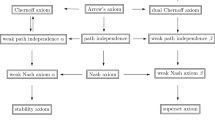Abstract
This paper focuses on the betweenness property of expected utility theory. We provide an axiomatization of the class of betweenness-conforming utility theories. Subclasses of betweenness-conforming preferences are axiomatized with ‘substitution’ axioms of intermediate generality. The latter axioms incorporate specifically the effects of replacing a certain outcome with a lottery that is indifferent to it. Our representation is applied to the second-price auction mechanism where we show that its demand-revelation property under expected utility is not robust with respect to the class of betweenness-conforming preferences.
Similar content being viewed by others
References
M. Allais, Le comportement de l'homme rational devant le risque, Econometrica 21(1953),503.
P. Billingsley,Convergence of Probability Measures (Wiley, New York, 1968).
S.H. Chew, A mixture-set axiomatization of weighted utility theory, Working Paper, University of Arizona (1982).
S.H. Chew, A generalization of the quasilinear mean with applications to measurement of income inequality and decision theory resolving the Allais paradox, Econometrica 51(1983)1065.
S.H. Chew, Implicit weighted and semi-weighted utility theories,M-estimators and the non-demand revelation of second-price auctions for an uncertain auctioned object, Working Paper, Johns Hopkins University (1985).
S.H. Chew, An axiomatic characterization of the rank-dependent quasilinear mean generalizing the Gini mean and the quasilinear mean, Working Paper, Johns Hopkins University (1985).
S.H. Chew and K.R. MacCrimmon, Alpha-nu choice theory: A generalization of expected utility theory, Working Paper, UBC (1979).
S.H. Chew and K.R. MacCrimmon, Alpha utility theory, lottery compositions and the Allais paradox, Working Paper, UBC (1979).
S.H. Chew and M.H. Mao, A Schur-concave characterization of risk aversion for nonlinear, nonsmooth continuous preferences, Working Paper (1985).
S.H. Chew and W.S. Waller, Empirical tests of weighted utility theory, J. Mathematical Psychology 30(1986)1.
E. Clarke, Multipart pricing of public goods, Public Choice 11(1971)17.
J.C. Cox, B. Roberson and V.L. Smith, Theory and behavior of single object auctions, in:Research in Experimental Economics, Vol. 2, ed. V.L. Smith (JAI Press, Greenwich, 1982).
H.S.M. Coxeter,Geometry (Wiley, New York, 1969).
G. Debreu, A social equilibrium existence theorem, Proc. Natl. Academy of Sciences 38(1952)886.
E. Dekel, An axiomatic characterization of preferences under uncertainty: Weakening the independence axiom, J. Economic Theory 22(1986)304.
D. Donaldson and J.A. Weymark, A single-parameter generalization of the Gini indices of inequality, J. Economic Theory 22(1980)67.
P.C. Fishburn, Transitive measurable utility, J. Economic Theory 31(1983)293.
P.C. Fishburn, Implicit mean value and certainty equivalence, Econometrica 54(1986).
D. Grether and C. Plott, Economic theory of choice and the preference reversal phenomenon, American Economic Review 69(1979)623.
T. Groves, Incentives in teams, Econometrica 41(1973)617.
F. Gul, A theory of disappointment aversion, mimeo. (1988).
I.N. Herstein and J. Milnor, An axiomatic approach to measurable utility, Econometrica 21(1953)291.
P.J. Huber,Robust Statistics (Wiley, New York, 1981).
D. Kahneman and A. Tversky, Prospect theory: An analysis of choice under risks, Econometrica 47(1979)263.
E. Karni and Z. Safra, ‘Preference reversal’ and the observability of preferences by experimental methods, Econometrica 55(1987)675.
E. Karni and Z. Safra, Dynamic consistency, revelations in auctions and the structure of preferences, mimeo. (1988).
K.R. MacCrimmon and S. Larsson, Utility theory: Axioms versus paradoxes, in:The Expected Utility Hypothesis and the Allais Paradox, ed. M. Allais and O. Hagen (Reidel, Dordrecht, 1979).
M. Machina, Expected utility analysis without the independence axiom, Econometrica 50(1982)277.
Y. Nakamura, Nonlinear utility analysis, Ph.D. Thesis, University of California, Davis (1984).
J. Quiggin, Anticipated utility theory, J. Economic Behavior and Organization (1982) 323.
U. Segal, Axiomatic representation of expected utility with rank-dependent probabilities, in:Choice under Uncertainty, ed. P.C. Fishburn and I.H. LaValle, Ann. Oper. Res., this volume.
A. Sen,On Economic Inequality (Oxford University Press, 1973).
W. Vickrey, Counterspeculation, auctions and competitive sealed tenders, J. Finance 16(1961)8.
J. von Neumann and O. Morgenstern,Theory of Games and Economic Behavior (Princeton University Press, Princeton, 1947).
R.J. Weber, The Allais paradox, dutch auctions, and alpha-utility theory, Working Paper, Northwestern University (1982).
M.E. Yaari, The dual theory of choice under risk: Risk aversion without diminishing marginal utility, Econometrica 55(1986)95.
Coombs and Huang, Empirical test of the betweenness axiom, J. Math. Psychology 13(1976)323.
Author information
Authors and Affiliations
Additional information
I would like to thank Larry Epstein, Itzhak Gilboa, Joe Harington, Edi Karni, Mark Machina, Roger Myerson, Zvi Safra, Fernando Saldanha, Itzhak Zilcha and Steve Zucker for their useful comments and helpful discussions. This is a revised version of an earlier working paper (Chew [5]). A simple version of semi-weighted utility was presented in an ‘exchange of views’ session at the Second International Conference on the Foundations of Utility and Risk Theories in Venice, June 1984. Versions of this paper have been presented at the University of California, San Diego (November 1985), the University of Pennsylvania (October 1985), Johns Hopkins University (October 1984), University of Arizona (January 1985) and Tel Aviv University (December 1984 and May 1985). I also wish to acknowledge the partial financial support from the National Science Foundation SES 8213602.
Rights and permissions
About this article
Cite this article
Chew, S.H. Axiomatic utility theories with the betweenness property. Ann Oper Res 19, 273–298 (1989). https://doi.org/10.1007/BF02283525
Issue Date:
DOI: https://doi.org/10.1007/BF02283525



